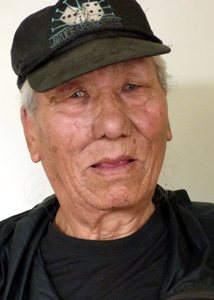Name: Ngawang Khedup
(Alias: No)
Gender: Male
Interview Age: 78
Date of Birth: 1937
Birthplace: Lhasa, Utsang, Tibet
Year Left Tibet: 1959
Profession: Monk
Monk/Nun: Previously
Political Prisoner: No

Interview No.: 1N
Date: 2015-04-07
Language: Tibetan
Location: Kathmandu, Bagmati, Nepal
Categories: Resistance and Revolution
Keywords: Chushi Gangdrug guerrillas, escape experiences, monastic life, refugee in India -- life as, Utsang
Summary:
Ngawang Khedup was born in Lhasa in 1937 long after his parents migrated there from Kham following trouble with Nationalist Chinese. His father worked as manager of a shika 'estate' near Lhasa. The estate was a source of income for the monastery that owned it. At the age of 6, Ngawang Khedup joined the Drepung Monastery as a monk where his brothers already resided. He talks about life in the monastery, his teachers and the different types of prayer assemblies and sessions in the great monastery.
Ngawang Khedup heard stories about Chinese atrocities and the suffering of people in eastern Tibet in the early 1950s. He left the monastery in 1959 along with many other monks to join the Chushi Gangdrug Defend Tibet Volunteer Force to fight the Chinese army. Ngawang Khedup had hopes of driving away the Chinese from Tibet. He describes the battles he participated in and the weapons they had available. He believes the lack of manpower and training forced the guerrillas to flee from Tibet.
Ngawang Khedup escaped to India and initially stayed in Missamari, working as a coolie and attending school during his spare time. Eventually he joined the Tibetan Unit of the Indian Army in 1962 hoping to return to fight the Chinese in Tibet after training, but the opportunity never arose. He retired from the army in 1987.
Interview Team:
- Marcella Adamski (Interviewer)
- Palden Tsering (Interpreter)
- Dhiraj Kafle (Videographer)

